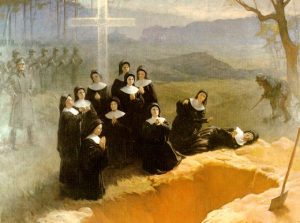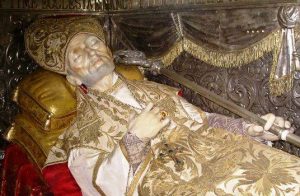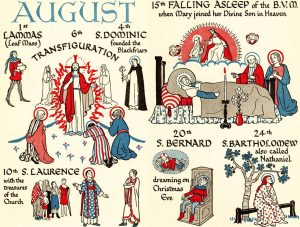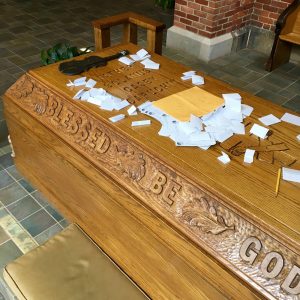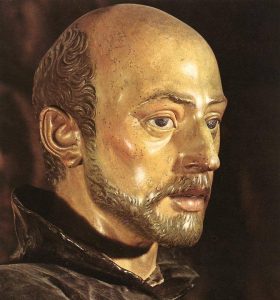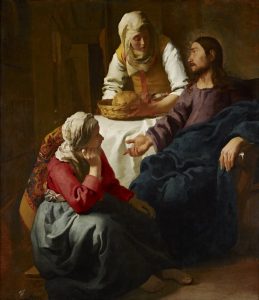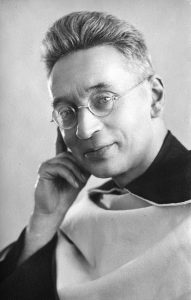The Democratic National Convention just finished and Republicans had their jamboree the week before last. I am finding it difficult to settle on the right candidate for governance of these American States. Neither of them, in my opinion, are right for high office. While I am not going to outline right now why I think so, I am merely offering my reservation for both political candidates.
What do I have to do to able to vote with an informed conscience? Is there a primacy of conscience? At this time, a good sense of one’s moral compass, the desire for the good of all, one can say that making a decision for a political candidate (party) today is not easily made or clearly or satisfying. Political elections is not supposed to be rooted in ideology but in solid principles based on Christian ethics (here I am speaking as a Catholic but there same would be said of people faith and good will applicable to all people) and Catholic Social Teaching. Using what the US bishops said, I have “the responsibility to make choices in political life [that] rests with each individual in light of a properly formed conscience” (FCFC, 37). Herein lies the hard and necessary work. In his 1993 document, Veritatis Splendor, John Paul taught that a human being “must act in accordance with [the judgement of conscience]. If man acts against this judgment or, in a case where he lacks certainty about the rightness and goodness of a determined act, still performs that act, he stands condemned by his own conscience, the proximate norm of personal morality” (60). This idea comes from the Thomistic tradition that says if one ignores the conscience one ignores God (even if the conscience is in error).
What is conscience? Among many things that can be said about conscience the teaching of the Church is that conscience is not a mechanism for one’s rationalization of one’s subjectivity, allowing for a person to do what he or she wants at will without the guidance of objective norms of the moral life. Conscience is relational to the objectivity of truth; the notion that there is my t truth and your truth is to retreat for truth because truth is not reduced to this type of certainty. One ought to consider what the Council Fathers taught about conscience they described it as “the voice of God resounding in the human heart, revealing the truth to us and calling us to do what is good while shining what is evil.” Moreover, “conscience is a judgment of reason whereby the human person recognizes the moral quality of a concrete act that he is going to perform, is in the process of performing, or has already completed.” Hence, we say conscience is basic to the person who seeks to know and do what is good and true based on a process of discernment and moral reasoning. The primacy of conscience is rooted in a sense of the truth first and foremost. This notion of primacy led Blessed John Henry Newman to say in this regard that “Certainly, if I am obliged to bring religion into after-dinner toasts… I shall drink –to the Pope, if you please, — still to Conscience first, and to the Pope afterwards.” The Authority of the pope and primacy of conscience are not in opposition to each other because both seek to know the truth: no conscience without the truth.
A conscience can err in its “[i]gnorance of Christ and his gospel, bad example given by others, enslavement to one’s passions, assertion of a mistaken notion of autonomy of conscience, rejection of the church’s authority and her teaching, [and] a lack of conversion and charity.” (FCFC 400).
But back to what is crucial: to keep in mind what promotes the dignity of the human person based on a well formed conscience as the guide for making a decision on a political candidate. The faithful, then, in the formation of conscience “ought carefully to attend to” church teaching with an openness of mind and heart regarding the reasons of thus-and-such moral point with the work of seeking and adhering to the truth; Thus, we ultimately are called upon submitting one’s reason and will with sincerity. Here we acknowledge the Church is a most reliable in the formation of conscience.
Areas of concern for the flourishing of human dignity:
- concerns for the family as “the first and fundamental unit of society”;
- principles for sacredness of life in the face of evils like abortion, euthanasia, IVF;
- just war teaching in both its jus ad bellum (when nations may go to war) and jus in bello (how war must be conducted) –even with the complexities of modern warfare;
- principles of subsidiarity and solidarity –the social security and welfare programs;
- a moral mandate of a just wage; the rights—and obligations—of workers generally;
- just immigration policies;
- rights of economic freedom/initiative and private property;
- support for good agricultural;
- support for good environmental stewardship;
- rights to health care and education; fighting unjust discrimination;
- a preferential option for the poor, elderly and chronically ill;
- and, a reasonable consideration for international debt relief of poor nations.
One help is the concept that the US bishops place on the table: “When all candidates hold a position that promotes an intrinsically evil act, the conscientious voter faces a dilemma. The voter may decide to take the extraordinary step of not voting for any candidate or, after careful deliberation, may decide to vote for the candidate deemed less likely to advance such a morally flawed position and more likely to pursue other authentic human goods” (FCFC, 36)
Some essays and resources to read:
Forming Consciences for Faithful Citizenship (2007; updated by the US bishops)
“Can a Catholic in good conscience vote for Trump?”
“Why I Must Oppose Donald Trump: One Priest’s Perspective”
a bibliography stitched by the UND
and consult with Joseph Ratzinger’s Conscience and Truth
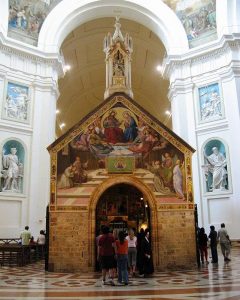 On August 2, the Franciscan family celebrates the Dedication of the Chapel of St. Mary of the Angels. It is known as the Portiuncula or “Little Portion,” restored by Saint Francis and the place where he and the early Friars made their home. Likewise, the Chapel is the place where Francis received Clare into the “movement” on March 28, 1211 and where he died in 1226.
On August 2, the Franciscan family celebrates the Dedication of the Chapel of St. Mary of the Angels. It is known as the Portiuncula or “Little Portion,” restored by Saint Francis and the place where he and the early Friars made their home. Likewise, the Chapel is the place where Francis received Clare into the “movement” on March 28, 1211 and where he died in 1226.